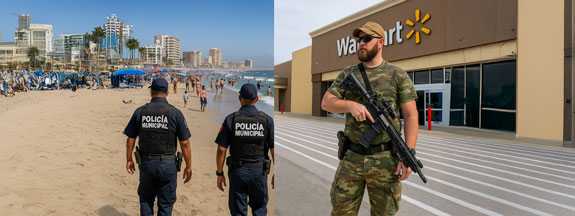If you’ve ever driven in northern Baja California—whether through Tijuana, Rosarito, or Ensenada—you’ve likely noticed the constant presence of police, military, and federal patrols. Understanding who these agents are, what powers they actually have, and how to respond to stops or checkpoints isn’t just smart—it’s essential for staying safe and asserting your rights lawfully.
This guide was created to clarify those gray areas that often lead to confusion, intimidation, or worse—especially for foreign residents and tourists unfamiliar with Mexican law. We break down each agency’s mandate, what they are legally allowed to do (and what they are not), and what your rights are in situations ranging from routine traffic stops to military checkpoints.
Disclaimer: This guide is for educational purposes only and does not constitute legal advice. It draws on the Mexican Constitution, federal laws like the Código Nacional de Procedimientos Penales (CNPP) and Ley de Migración, local traffic regulations for Tijuana, Rosarito, and Ensenada, as well as government portals from SEDENA, Guardia Nacional, FGR, FGE BC, and the human rights commission CEDHBC.
Meet the Agencies: Who You Might Encounter and Why
Navigating law enforcement in northern Baja means knowing which agency you’re dealing with—and what that means for your rights. Here’s a quick guide to the most common ones:
Policía de Tránsito (Municipal Traffic Police)
These are the uniformed officers most likely to stop you for a moving violation. Their authority is limited to their municipality and is based on local traffic laws:
They enforce vehicle safety, signage, speed limits, and accident procedures—not criminal law.
Policía Municipal
Municipal police have a broader scope. They respond to local crimes, patrol neighborhoods, and sometimes support traffic enforcement. They are governed by local public order codes (Bando de Policía y Buen Gobierno) and the CNPP. They can detain individuals if a crime is witnessed in flagrante delicto.
FGE (State Prosecutor) and AEI (State Investigative Police)
The Fiscalía General del Estado de Baja California (FGE BC) directs investigations into state crimes like burglary, assault, or homicide. Their agents—Agencia Estatal de Investigación (AEI)—typically operate in plain clothes and conduct warrant-based actions or investigative stops. See FGE BC.
FGR (Federal Prosecutor) and PFM (Federal Ministerial Police)
The Fiscalía General de la República (FGR) handles federal crimes: organized crime, drugs, firearms, etc. Their agents—Policía Federal Ministerial (PFM)—conduct operations and investigations, not routine patrols. More info at FGR.
Guardia Nacional (GN)
Created in 2019, the GN blends military and civilian policing and operates nationwide, especially on highways and in areas of federal interest. They can stop vehicles, make arrests, and run checkpoints, especially for federal crime enforcement or highway safety. Reference: Guardia Nacional, Ley de la Guardia Nacional.
SEDENA (Secretaría de la Defensa Nacional – Military)
Military presence is common in Baja, but soldiers cannot lawfully stop or search civilians on their own. Their public security role is restricted unless they’re accompanying police or operating within an officially sanctioned checkpoint. This is backed by Article 129 of the Constitution and confirmed in reporting from Zeta Tijuana and San Diego Union-Tribune.
Can They Stop You? Who Can Pull You Over and When
Understanding who can lawfully stop your vehicle in northern Baja—and under what circumstances—is crucial for asserting your rights and avoiding unlawful or abusive encounters.
Legal Framework: Article 16 of the Mexican Constitution
The cornerstone of personal protection against arbitrary stops in Mexico is Article 16 of the Mexican Constitution, which states that “no one may be disturbed in their person, family, domicile, papers or possessions, except by written order of a competent authority”—with precise legal justification (CPEUM, Art. 16).
Exceptions exist, especially in cases of flagrancia (being caught in the act of committing a crime) or when there is reasonable suspicion grounded in objective facts.
Policía de Tránsito: Municipal-Level Traffic Enforcement
The Policía de Tránsito in each municipality—Tijuana, Rosarito, and Ensenada—can legally stop vehicles only if a traffic law appears to have been violated. These laws are outlined in their respective Reglamento de Tránsito (Tijuana, Rosarito, Ensenada). If there’s no visible infraction (e.g., speeding, missing plate, illegal turn), the stop may be unlawful.
Policía Municipal: Broader Powers with Limits
Municipal police can initiate a stop under two conditions:
- A traffic violation has occurred (if authorized locally), or
- There is “sospecha razonable” (reasonable suspicion) of a crime, which must be based on observable facts—not personal bias or profiling.
This aligns with principles from the Código Nacional de Procedimientos Penales (CNPP) (Art. 268, CNPP PDF).
Guardia Nacional: Federal Jurisdiction and Highways
The Guardia Nacional (GN) operates nationwide, often focusing on federal highways and high-crime areas. They can stop vehicles for:
- Federal traffic violations
- Reasonable suspicion of federal crimes (e.g., weapons, smuggling)
- At designated and legal federal checkpoints
GN authority is grounded in both the Ley de la Guardia Nacional (Ley GN) and federal protocols (GN official site).
FGE and FGR: Investigative Agencies, Not Routine Patrol
The FGE (State Prosecutor) and FGR (Federal Prosecutor) command investigative police (AEI and PFM respectively). Their stops are targeted, based on:
- Surveillance
- Informant intelligence
- Active investigations
- Execution of warrants
- Flagranza (e.g., seeing drugs in plain view)
They do not patrol for general enforcement and generally cannot stop vehicles without investigative justification (FGE BC, FGR).
SEDENA (Mexican Military): Highly Restricted Authority
SEDENA (Army/Air Force) personnel have no inherent legal authority to stop civilian vehicles unless:
- They witness a crime in progress (flagrancia)
- They are part of a legally sanctioned checkpoint with civilian oversight
- They are directly supporting an operation led by civilian police
Military-only stops without civilian agents present may violate Article 129 of the Constitution (SEDENA framework). Legal scholars and journalists confirm this limit (Zeta Tijuana, May 2023, San Diego Union-Tribune).
Search Me? Searches, Exits, and Passenger Rights
Getting stopped doesn’t automatically give law enforcement the right to search your car or order you out of it. Here’s what the law actually says about searches and movement during traffic stops or roadside encounters in Baja California.
Search Authority: Flagrancia, Consent, or Warrant
Under Article 16 of the Mexican Constitution and Articles 146 and 266 of the Código Nacional de Procedimientos Penales (CNPP), all searches must meet at least one of three conditions:
-
Flagrancia (caught in the act): Officers may search without a warrant if they observe a crime in progress or its immediate aftermath. This is a common justification during checkpoints or when contraband is clearly visible. CNPP PDF - Article 146
-
Consent: If you give informed, voluntary consent, a search is allowed. Coerced or unclear “consent” is not valid. You may refuse unless officers have a legal basis. See Animal Político’s legal guide
-
Judicial warrant: For interior searches unrelated to an immediate crime or consent, a warrant issued by a judge is required.
Anything less—like a vague claim of “random inspection”—is usually not legal unless it’s taking place at a formally established and properly signposted checkpoint.
“Exterior Inspections” vs. Full Searches
The CNPP (Article 268) allows officers to conduct a visual inspection of a vehicle’s exterior if there’s reasonable suspicion—e.g., bulging panels or hidden compartments. But opening doors, searching the glovebox, or rifling through personal items goes beyond this and typically requires flagrancia or consent.
Can They Order You Out of the Vehicle?
Yes, in specific situations. Officers may ask you or passengers to exit a vehicle when:
- There is a credible safety concern (e.g., suspected weapon)
- They are conducting field sobriety tests
- A search is legally justified (see above)
- They need to clear the area after an accident
However, in a routine traffic stop with no escalating circumstances, demanding all passengers exit without cause may exceed their authority. In practice, noncompliance can escalate tensions, so refusing should be done cautiously—even if you believe the order is unlawful.
Do Passengers Have to Show ID?
Passengers are not normally required to provide ID during routine stops for traffic violations. Demands to do so should only arise if there is a separate legal reason, such as:
- A reasonable suspicion the passenger is involved in a crime
- The stop escalates to involve investigation or detention
For foreigners, producing ID voluntarily (passport, residency card) is often advisable to avoid further scrutiny—but there is no blanket requirement unless the stop has shifted into an official investigation.
Immigration Checks: Who Can Ask for Your Papers
One of the most common points of confusion—especially for foreigners—is whether local police or military personnel can ask for immigration documents. The answer is clear under Mexican law: only the immigration agency (INM) has legal authority to enforce immigration status.
The Only Authorized Agency: INM
The Instituto Nacional de Migración (INM) is the sole authority empowered to:
- Demand passports, visas, or residency permits
- Conduct immigration inspections at checkpoints, airports, or offices
- Detain and process individuals for immigration violations
This is established under the Ley de Migración (Ley de Migración PDF, Article 20) and explained in INM’s public-facing Know Your Rights and Obligations Guide.
What Other Agencies Can’t Do
Municipal Police, Traffic Officers, Guardia Nacional, and SEDENA do not have independent authority to request or verify immigration status during routine stops.
These agencies:
- Cannot detain someone solely to verify immigration status
- Cannot deport, question, or photograph foreign nationals for documentation purposes
- May only refer someone to INM if a lawful stop escalates into suspicion of an immigration-related federal crime (e.g., human smuggling)
Any direct demand from police or military for passports or visas—especially in a routine stop—is usually an overreach and may signal profiling or an attempt at extortion.
Legal Exceptions: When Others May Be Involved
There are limited exceptions where other agencies may participate:
- Joint operations led by INM: Other officers may assist INM at checkpoints or during sweeps
- Flagrancia: If a non-INM agent witnesses someone actively smuggling migrants or falsifying documents, they may detain and hand the person over to INM
- Lack of any ID during criminal detention: Officers may detain a person who cannot identify themselves after a lawful stop and then refer the case to INM for verification—not process it themselves
Discrimination and Profiling
Mexican law and the Constitution (Article 11) guarantee freedom of movement within the country and protect against arbitrary detentions. Demands for immigration status based on appearance, accent, or assumptions are not only improper—they can be a basis for a human rights complaint with CEDHBC or CNDH.
Tickets and Fines: How the Process Should Work
If you’re cited for a traffic violation in Baja California, knowing the correct procedure can help you avoid scams, extortion attempts, or improper detentions. Here’s what to expect—and what to insist on.
What a Boleta de Infracción Must Include
For any alleged violation, officers must issue a written citation, called a boleta de infracción, at the scene. A valid boleta must contain:
- Driver’s full name
- Vehicle information (make, model, license plate)
- Precise location, date, and time of the violation
- Specific traffic law(s) cited (article and ordinance)
- Officer’s full name, badge number (número de placa or gafete), and signature
- Amount of the fine (usually expressed in UMA units)
- Clear payment instructions and deadlines
Relevant municipal regulations include:
Receiving a properly filled boleta is essential. If an officer refuses to provide one, or demands immediate cash, that’s a major red flag.
You Do Not Have to Follow Officers to the Station
The Consulado Mexicano guidance for tourists clearly states:
“If you are stopped by the police, you should not be asked to follow the officer to the station. A ticket should be issued on the spot” (Fodors Travel Guide).
Unless you are being formally detained for something more serious (like DUI or resisting authority), you should receive a citation and be free to go.
Paying Fines: Options and Guarantees
- Payment later: Drivers have the right to pay fines later at municipal offices, banks, or online portals. Many municipalities offer early payment discounts (up to 50%).
- Guarantee (document retention): Officers may legally retain a driver’s license, registration, or even license plates as a “guarantee” until the fine is paid—especially for foreign plates.
This must be recorded on the boleta itself.
You should never be required to hand over cash on the spot to the officer.
Cost Breakdown: UMA-Based Fines
Traffic fines are calculated based on the Unidad de Medida y Actualización (UMA), which is updated annually.
For 2024: 1 UMA = $108.57 MXN (INEGI UMA Data).
Typical fine ranges in Tijuana, Rosarito, and Ensenada based on 2024 UMA values:
| Violation | UMA Range | Estimated Fine (MXN) |
|---|---|---|
| Speeding | 10–30 UMA | $1,085–$3,257 |
| Running a Red Light | 10–20 UMA | $1,085–$2,171 |
| No Seatbelt | 5–10 UMA | $543–$1,085 |
| Using Phone While Driving | 10–15 UMA | $1,085–$1,628 |
| DUI (Drunk Driving) | 50–100+ UMA | $5,429–$10,857+ |
Sources:
Knowing these ranges helps spot inflated fine demands, another common extortion tactic.
Lights, Cameras, Action: Filming Police Interactions
Recording public officials—especially police—while they perform their duties is an important tool for accountability. In Mexico, citizens have the right to document police actions in public spaces, although knowing the boundaries is key to staying safe.
Constitutional Protections for Filming
Your right to film public officials is protected by two fundamental articles of the Mexican Constitution:
- Article 6: Guarantees freedom of expression and the right to seek, receive, and impart information.
- Article 7: Guarantees freedom of the press.
These constitutional rights have been interpreted to include the right to record public officials in public spaces, particularly when documenting acts of authority.
While not explicitly codified in a single law as “the right to film police,” human rights commissions and courts consistently uphold this interpretation.
Relevant guidance:
- CEDHBC Statement on Right to Document Police Acts
- Animal Político report on filming legality and risks
Practical Best Practices When Filming
While legally allowed, filming encounters can sometimes provoke resistance from officers unfamiliar with the law—or who have reasons to discourage documentation. Here’s how to minimize risk:
- Stay calm and respectful: Avoid arguments. Politeness defuses many confrontations.
- Maintain distance: Do not physically interfere with officers’ work.
- State your rights if challenged: You may calmly say:
“Estoy ejerciendo mi derecho constitucional a documentar un acto de autoridad en un espacio público, conforme al Artículo 6.”
(I am exercising my constitutional right to document an act of authority in a public space, according to Article 6.)
- Prioritize safety: If officers become aggressive, it’s often safer to stop filming and comply under protest rather than risk escalation. You can later file complaints.
- Document resistance: If safe, film or note any threats or illegal orders (such as an order to delete footage).
When Filming Could Be Limited
Authorities may legitimately restrict recording if:
- You are obstructing active law enforcement work (e.g., standing between officers and a suspect).
- You are violating privacy rights of third parties (such as recording minors or victims without consent).
- The scene involves sensitive security operations (though even then, restrictions must be minimal and justified).
However, merely filming from a public area is not a valid reason for officers to interfere.
If You Are Forced to Stop Filming
If an officer illegally orders you to stop:
- Comply if necessary for safety.
- State aloud that you are stopping under protest (e.g., “Estoy dejando de grabar porque me lo ordenan bajo amenaza”).
- Keep the device safe and secure any footage immediately if possible.
- Report the incident to the relevant oversight body later (e.g., CEDHBC or CNDH).
Red Flags: Spotting Extortion or Impersonation
Unfortunately, incidents of police misconduct, including extortion and impersonation, have been reported across northern Baja. Recognizing warning signs early can help you avoid becoming a target.
Common Extortion Tactics
According to reports from Discover Baja Travel Club and Mexico Relocation Guide, common red flags for extortion attempts include:
- Immediate demand for cash at the scene rather than issuing a formal boleta de infracción.
- Threats of jail time for minor traffic violations (e.g., speeding, seatbelt infractions) unless a “fine” is paid immediately.
- Insistence on accompanying the officer to an ATM to withdraw money.
- Inflated fine amounts far beyond normal ranges for routine violations.
- Reluctance to show identification, badge, or patrol vehicle markings.
If any of these occur, it’s likely the officer is acting outside official protocol—and possibly committing a crime.
How to Respond to Suspected Extortion
If you suspect an officer is trying to extort you:
- Stay calm and polite, but firm.
- Request the official ticket (boleta de infracción):
“Por favor, ¿me puede dar mi boleta de infracción?”
- Refuse to pay cash at the scene:
“Prefiero recibir mi boleta y pagar oficialmente.”
- Ask for the officer’s name, badge number, and patrol unit.
- Document details discreetly: date, time, location, badge number, vehicle ID.
- Call 911 discreetly to verify the officer’s identity if you feel unsafe (more below).
Even if you feel intimidated into complying under duress, you can and should report the incident later.
Spotting Impersonators: Key Differences
Sometimes individuals pose as police or military to extort or rob. Genuine officers typically:
- Wear full, proper uniforms (with patches, agency logos, name tags).
- Drive marked patrol vehicles with agency insignias and unit numbers.
- Present official identification (gafete or badge) without hesitation if requested.
Be especially wary of:
- Unmarked vehicles attempting to stop you (especially for minor issues).
- Partial or mismatched uniforms.
- Refusal to provide ID upon request.
If something feels wrong, slow down but do not immediately stop in a deserted area. Head toward a busy public place, gas station, or even police station before pulling over.
Verifying Officers on the Spot
In suspicious situations:
- Call 911 and calmly explain:
“Estoy siendo detenido en [location]. ¿Pueden verificar si es un operativo legítimo?”
- Provide any visible details (license plate of the patrol vehicle, agency markings, badge numbers).
911 operators can often confirm whether a legitimate operation is underway in your area.
Reporting Misconduct or Impersonation
If you believe you encountered extortion or impersonation:
- Report to your city’s Sindicatura Procuradora:
- File a criminal complaint (denuncia penal) with the FGE Baja California or FGR for impersonation or corruption.
Prompt reporting helps authorities address misconduct—and may protect others from similar abuses.
Reporting Misconduct: Where to File a Complaint
If you experience misconduct—whether extortion, abuse of authority, or impersonation—it’s important to know how and where to file a formal complaint. Baja California offers several channels depending on the agency involved.
Municipal Complaints: Sindicatura Procuradora
For issues involving Municipal Police or Traffic Police (Policía de Tránsito), each municipality has an independent oversight office called the Sindicatura Procuradora, tasked with investigating administrative misconduct like extortion or abuse of authority.
- Tijuana: File a complaint here
- Rosarito: Rosarito - In Person Only
- Ensenada: Ensenada Sindicatura page
Sindicaturas investigate, recommend sanctions, and sometimes refer cases to prosecutors for criminal investigation.
State Complaints: FGE Baja California
For misconduct involving agents of the State Attorney General’s Office (FGE) or its investigative police (AEI):
- Submit a complaint to the Órgano Interno de Control within FGE BC.
They oversee disciplinary actions against state-level law enforcement personnel.
Federal Complaints: Guardia Nacional, FGR, SEDENA
For misconduct involving Federal Police, Guardia Nacional, or the military (SEDENA):
- Guardia Nacional: File with the Unidad de Asuntos Internos.
- FGR Agents (Federal Prosecutors and Policía Federal Ministerial): Use FGR’s reporting portal or visit a federal delegation office.
- SEDENA: Cases involving soldiers are usually referred through human rights commissions or the military’s own internal justice system.
Important: SEDENA personnel actions against civilians often trigger constitutional concerns (Article 129), making complaints to human rights bodies even more relevant.
Human Rights Violations: State and National Commissions
For any serious abuses of authority, such as:
- Illegal detention
- Physical abuse
- Racial profiling
- Threats or intimidation
You can file complaints with human rights commissions:
- State level: Comisión Estatal de Derechos Humanos de Baja California (CEDHBC)
- National level: Comisión Nacional de Derechos Humanos (CNDH)
These commissions independently investigate abuses and issue public recommendations.
Foreign Nationals: Contact Your Consulate
If you are a U.S. citizen (or citizen of another country) facing serious misconduct:
- Contact the U.S. Consulate General in Tijuana.
- Most embassies offer citizen protection services, can assist with documentation, and sometimes intervene with local authorities.
Knowledge, Calm, and Preparedness
Navigating law enforcement encounters in northern Baja California can feel daunting—especially with the complex mix of local police, federal forces, and even military patrols. But knowledge is your greatest protection.
This guide equips you with three essential tools for safe, confident interactions:
Knowledge
Understanding who has the authority to stop you, under what conditions they can search you or demand documents, and what procedures they must follow fundamentally shifts the power dynamic.
Key takeaways include:
- Only the Instituto Nacional de Migración (INM) can demand immigration documents.
- Traffic police enforce traffic laws—not criminal investigations.
- Municipal police must base stops on reasonable suspicion, not profiling.
- Guardia Nacional can lawfully stop vehicles, but even they must follow federal rules.
- Military personnel (SEDENA) cannot independently detain civilians without special circumstances.
Calm, Respectful Confidence
How you conduct yourself matters just as much as what you know:
- Stay polite and non-confrontational, even when asserting your rights.
- Request clarification respectfully if something feels wrong (e.g., “¿Me puede explicar bajo qué artículo me está deteniendo?”).
- Avoid escalating situations—safety first, especially if officers are aggressive or improperly trained.
Documentation and Recourse
Always document encounters when safe:
- Note officer names, badge numbers, patrol vehicle IDs.
- Record key details: location, time, nature of the stop.
- Film interactions where possible, staying mindful of best practices.
- Save all official paperwork (tickets, citations) carefully.
If misconduct occurs, use official channels—municipal sindicaturas, state internal affairs, human rights commissions, or consular support—to pursue accountability.
Keep This Guide Handy
Consider bookmarking or printing this guide to keep in your vehicle or travel documents folder.
Laws evolve and procedures change, so we will update this resource regularly to reflect new legal developments and best practices.
Your awareness not only protects you—it contributes to strengthening civil rights protections for everyone traveling or living in Baja California.




Leave a comment